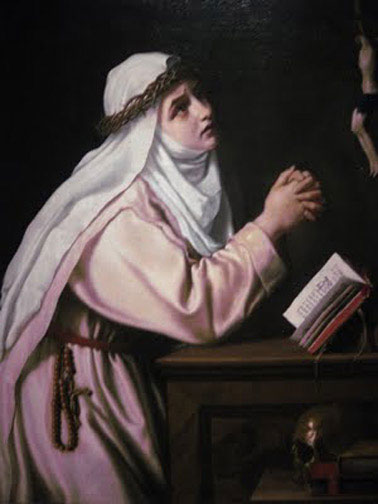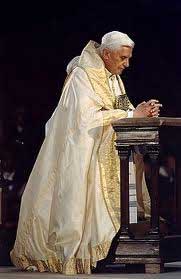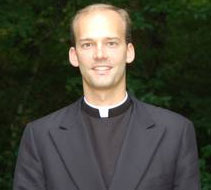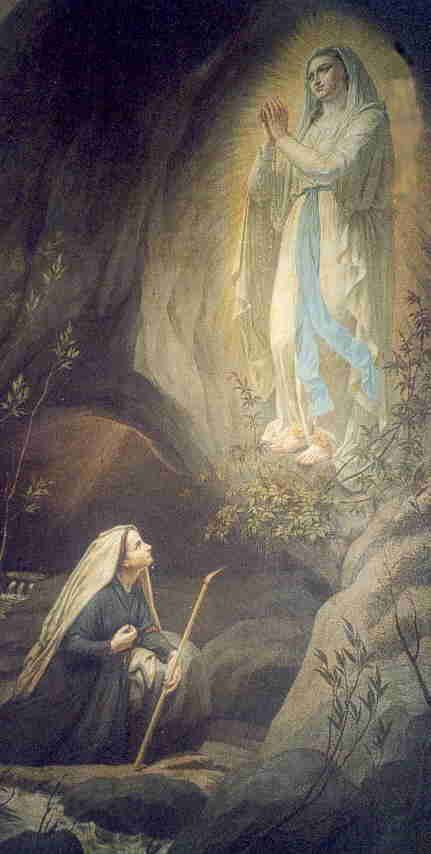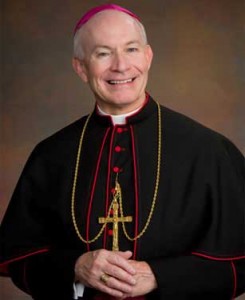[powerpress]Episode 5 -Crossing the Desert: Lent and Conversion – “Leaving the Desert”.  
“Celebrating the sacrament of reconciliation is, for many Catholics, a most daunting prospect.  This sacrament has been the source of many jokes, composed perhaps by persons seeking to reduce the level of stress they feel regarding one of its main components:  naming personal sin.
The naming of one’s own sin to oneself and to a priest is self-revelatory to the point of evoking anxiety.  Initially, it can be true that some level of apprehension may accompany this sacrament, but over time with regular celebration of this form of worship, anxiety diminishes.  Most positively the sacrament of reconciliation promotes truthful self-knowledge regarding sin in the context of Christ’s saving presence.  Once someone experiences both the naming of sin and the reception of God’s mercy in this sacrament, he or she actually begins to celebrate this sacrament and see it as a great gift from Christ and his Church.”
Deacon James Keating, PhD, the director of Theological Formation for the Institute for Priestly Formation, located at Creighton University, in Omaha, is making available to â€Discerning Hearts†and all who listen, his series of programs entitled “Crossing the Desertâ€.
For more information on the “Institute of Priestly Formation†and for other material available by Deacon Keating, just click here
Check out Deacon Keating’s “Discerning Heart†page
Tags: creighton university, Deacon James Keating, institute for priestly formation, sacrament, sin
This entry was posted on Wednesday, March 25th, 2015 at 10:55 am
You can follow any responses to this entry through the RSS 2.0 feed.
[powerpress]
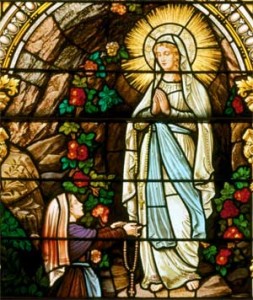 “You are all fair, O Mary, and there is in you no stain of original sin.” O Mary, conceived without sin, pray for us who have recourse to thee. O brilliant star of sanctity, as on that lovely day, upon a rough rock in Lourdes you spoke to the child Bernadette and a fountain broke from the plain earth and miracles happened and the great shrine of Lourdes began, so now I beseech you to hear our fervent prayer and do, we beseech you, grant us the petition we now so earnestly seek.
“You are all fair, O Mary, and there is in you no stain of original sin.” O Mary, conceived without sin, pray for us who have recourse to thee. O brilliant star of sanctity, as on that lovely day, upon a rough rock in Lourdes you spoke to the child Bernadette and a fountain broke from the plain earth and miracles happened and the great shrine of Lourdes began, so now I beseech you to hear our fervent prayer and do, we beseech you, grant us the petition we now so earnestly seek.
(make your request)
O Brilliant star of purity, Mary Immaculate, Our Lady of Lourdes, glorious in your assumption, triumphant in your coronation, show unto us the mercy of the Mother of God, Virgin Mary, Queen and Mother, be our comfort, hope, strength, and consolation. Amen.
Our Lady of Lourdes, pray for us.
Saint Bernadette, pray for us.
Tags: assumption, Mary Immaculate, our lady of lourdes novena, Saint Bernadette, sin, virgin mary
This entry was posted on Wednesday, February 4th, 2015 at 7:27 am
You can follow any responses to this entry through the RSS 2.0 feed.
The Novena for Holy Souls in Purgatory, Day 9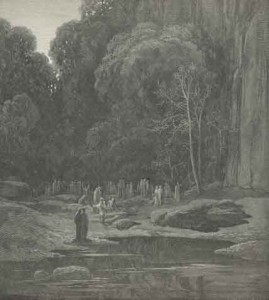
composed by by St. Alphonsus of Liguori
[powerpress]
My God! How was it possible that I, for so many years, have borne tranquilly the separation from Thee and Thy holy grace! O infinite Goodness, how long-suffering hast Thou shown Thyself to me! Henceforth, I shall love Thee above all things. I am deeply sorry for having offended Thee; I promise rather to die than to again offend Thee. Grant me the grace of holy perseverance, and do not permit that I should ever again fall into sin. Have compassion on the holy souls in Purgatory. I pray Thee, moderate their sufferings; shorten the time of their misery; call them soon unto Thee in heaven, that they may behold Thee face to face, and forever love Thee. Mary, Mother of Mercy, come to their aid with thy powerful intercession, and pray for us also who are still in danger of eternal damnation.
Say the following prayers: 1 Our Father… 1 Hail Mary… The Prayer to Our Suffering Saviour for the Holy Souls in Purgatory found below.
Visit the Discerning Hearts “Holy Souls†page for the complete novena and text of the prayers
Tags: catholic, catholic podcast, catholic prayer, cathollc spirituality, heaven, holy souls, holy souls in purgatory, intercession, prayers, purgatory, sin, souls in purgatory
This entry was posted on Saturday, November 1st, 2014 at 12:01 am
You can follow any responses to this entry through the RSS 2.0 feed.
Temporal Consequences for Sin
[powerpress]
Common sense tells us that our sins have consequences.  If after committing a sin, we confess, then God promises to forgive us.  Yet there can still remain what the Church calls a “temporal punishment,†or consequence, for our sin.
For instance, in 2 Samuel 12 after David confesses his sin of adultery, the prophet Nathaniel tells him that the Lord has forgiven him, but nevertheless he will suffer the death of his child as a consequence of his sin.1  Our relationship with God is a personal one and our sins are not just rule violations, but personal offenses that need to be mended.
We can fulfill the temporal punishments for our sins through sincere sorrow for our sins, prayers, sacrifices, and acts of charity.

But as part of the Body of Christ, we can also assist in coming to the aid of our brothers and sisters, both living and dead.  This is the basic principle of the Church’s practice of indulgences, and undoubtedly what St. Paul has in mind in Colossians 1:24 where he says, “I rejoice in my sufferings, and complete what is lacking in Christ’s affliction for the sake of his body, the Church.â€Â  Or perhaps it’s put best in 1 Peter 4:8, which simply states, “love covers a multitude of sins.â€
1Â -Â Â 2Â Sam. 12:13-14
Tags: catholic, catholic podcast, catholic prayer, cathollc spirituality, indulgences, sin
This entry was posted on Friday, September 19th, 2014 at 3:01 am
You can follow any responses to this entry through the RSS 2.0 feed.
[powerpress]
My Nature Is Fire
In your nature, eternal Godhead,
I shall come to know my nature.
And what is my nature, boundless love?
It is fire,
because you are nothing but a fire of love.
And you have given humankind
a share in this nature,
for by the fire of love you created us.
And so with all other people
and every created thing;
you made them out of love.
O ungrateful people!
What nature has your God given you?
His very own nature!
Are you not ashamed to cut yourself off from such a noble thing
through the guilt of deadly sin?
O eternal Trinity, my sweet love!
You, light, give us light.
You, wisdom, give us wisdom.
You, supreme strength, strengthen us.
Today, eternal God,
let our cloud be dissipated
so that we may perfectly know and follow your Truth in truth,
with a free and simple heart.
God, come to our assistance!
Lord, make haste to help us!
Amen.
This entry was posted on Tuesday, December 31st, 2013 at 3:26 am
You can follow any responses to this entry through the RSS 2.0 feed.

Teresa Monaghen, of Pro Sanctity and Fr. John Sianchuck, C.Ss.R., a Ukranian Byzantine priest do a great job of explaining the Western and Eastern understanding of this great mystery.
Take a listen to the discussion posted above, that Bruce and I had with Teresa Monaghen, from Pro Sanctity and Fr. John Sianchuk, C.Ss.R., a Ukrainian Redemptorist priest discuss the difference and similarities of Western and Eastern understanding of the Immaculate Conception of the Blessed Virgin Mary
[powerpress]
From the Catechism of the Catholic Church on the Immaculate Conception,Â
 “490 To become the mother of the Savior, Mary “was enriched by God with gifts appropriate to such a role.”132 The angel Gabriel at the moment of the annunciation salutes her as “full of grace”.133 In fact, in order for Mary to be able to give the free assent of her faith to the announcement of her vocation, it was necessary that she be wholly borne by God’s grace.
“490 To become the mother of the Savior, Mary “was enriched by God with gifts appropriate to such a role.”132 The angel Gabriel at the moment of the annunciation salutes her as “full of grace”.133 In fact, in order for Mary to be able to give the free assent of her faith to the announcement of her vocation, it was necessary that she be wholly borne by God’s grace.
491 Through the centuries the Church has become ever more aware that Mary, “full of grace” through God,134 was redeemed from the moment of her conception. That is what the dogma of the Immaculate Conception confesses, as Pope Pius IX proclaimed in 1854:
- The most Blessed Virgin Mary was, from the first moment of her conception, by a singular grace and privilege of almighty God and by virtue of the merits of Jesus Christ, Savior of the human race, preserved immune from all stain of original sin.135
 492 The “splendor of an entirely unique holiness” by which Mary is “enriched from the first instant of her conception” comes wholly from Christ: she is “redeemed, in a more exalted fashion, by reason of the merits of her Son”.136 The Father blessed Mary more than any other created person “in Christ with every spiritual blessing in the heavenly places” and chose her “in Christ before the foundation of the world, to be holy and blameless before him in love”.137
493 The Fathers of the Eastern tradition call the Mother of God “the All-Holy” (Panagia), and celebrate her as “free from any stain of sin, as though fashioned by the Holy Spirit and formed as a new creature”.138 By the grace of God Mary remained free of every personal sin her whole life long. ”
  This video does a nice job of tracking the history of the dogma
Tags: angel gabriel, ark of the covenant, blessed virgin mary, catechism of the catholic church, dogma of the immaculate conception, eastern tradition, immaculate conception, John Sianchuk, mary full of grace, mother of god, new ark, new creature, pope pius ix, sin, singular grace, teresa monaghen
This entry was posted on Monday, December 9th, 2013 at 12:08 am
You can follow any responses to this entry through the RSS 2.0 feed.
Episode 7 -Listening For Truth–   Resurrection people who live out of the power of the Resurrection.  Theological virtues, faith, hope and love, are given to us in the fullest sense through the sacraments and how we receive and open our hearts to that gift.  Moving our affection from sin to truth.  How do we prepare ourselves to receive moral truth?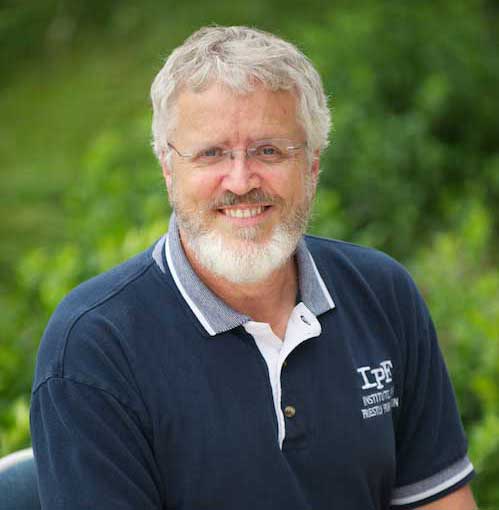
[powerpress]
Deacon James Keating, PhD., the director of Theological Formation for the Institute for Priestly Formation, located at Creighton University, in Omaha, is making available to â€Discerning Hearts†and all who listen, his series of programs entitled “Listening For Truthâ€.
 Listening for Truth leads men and women in a search for a fuller experience of God that begins in prayer, grows in the rediscovery of our spiritual being, and grounds itself in the truth of Jesus Christ. A presentation of the Christian life as an engagement of the whole person — body, mind, and soul — in the challenge of daily living.
Listening for Truth leads men and women in a search for a fuller experience of God that begins in prayer, grows in the rediscovery of our spiritual being, and grounds itself in the truth of Jesus Christ. A presentation of the Christian life as an engagement of the whole person — body, mind, and soul — in the challenge of daily living.
For more information on the “Institute of Priestly Formation†and for other material available by Deacon Keating, just click here
Don’t forget to pickup a copy of “Communion with Christ†, it is one of the best audio sets on prayer…ever!
Check out Deacon Keating’s “Discerning Heart†page
Tags: creighton university, Deacon James Keating, sin, truth
This entry was posted on Tuesday, October 1st, 2013 at 9:43 am
You can follow any responses to this entry through the RSS 2.0 feed.
Episode 6 -Listening For Truth–   The difficult stage in moral conversion, not only leaving the sin behind, but also leaving the community of people who desire to hold on to that sin.  It might mean separating from family members, friends, etc, but the hope is that that may possibly follow if we hang in there in that witness of Truth.  Also, life doesn’t stop in our suffering. Many will come who are attracted to the change. How we love those in need will indicate growth even in the crucifixion.  The negative…we reject something, the positive…we embrace something.
[powerpress]
Deacon James Keating, PhD., the director of Theological Formation for the Institute for Priestly Formation, located at Creighton University, in Omaha, is making available to â€Discerning Hearts†and all who listen, his series of programs entitled “Listening For Truthâ€.
 Listening for Truth leads men and women in a search for a fuller experience of God that begins in prayer, grows in the rediscovery of our spiritual being, and grounds itself in the truth of Jesus Christ. A presentation of the Christian life as an engagement of the whole person — body, mind, and soul — in the challenge of daily living.
Listening for Truth leads men and women in a search for a fuller experience of God that begins in prayer, grows in the rediscovery of our spiritual being, and grounds itself in the truth of Jesus Christ. A presentation of the Christian life as an engagement of the whole person — body, mind, and soul — in the challenge of daily living.
For more information on the “Institute of Priestly Formation†and for other material available by Deacon Keating, just click here
Don’t forget to pickup a copy of “Communion with Christ†, it is one of the best audio sets on prayer…ever!
Check out Deacon Keating’s “Discerning Heart†page
Tags: creighton university, Deacon James Keating, Deacon Keating, prayer, sin
This entry was posted on Monday, September 16th, 2013 at 10:04 am
You can follow any responses to this entry through the RSS 2.0 feed.
“For the hand of the Lord was with him”
[powerpress]
an excerpt from today’s reflection by Don Schwager:
John the Baptist’s life was fueled by one burning passion – to point others to Jesus Christ and to the coming of God’s kingdom.  Scripture tells us that John was filled with the Holy Spirit even from his mother’s womb (Luke 1:15, 41) by Christ himself, whom Mary had just conceived by the Holy Spirit. When Mary visited her cousin Elizabeth, John lept in the womb of Elizabeth as they were filled with the Holy Spirit (Luke 1:41). The fire of the Spirit dwelt in John and made him the forerunner of the coming Messiah. John was led by the Spirit into the wilderness prior to his ministry where he was tested and grew in the word of God. John’s clothing was reminiscent of the prophet Elijah (see Kings 1:8). John broke the prophetic silence of the previous centuries when he began to speak the word of God to the people of Israel. His message was similar to the message of the Old Testament prophets who chided the people of God for their unfaithfulness and who tried to awaken true repentance in them. Among a people unconcerned with the things of God, it was his work to awaken their interest, unsettle them from their complacency, and arouse in them enough good will to recognize and receive Christ when he came.
Scripture tells us that John was filled with the Holy Spirit even from his mother’s womb (Luke 1:15, 41) by Christ himself, whom Mary had just conceived by the Holy Spirit. When Mary visited her cousin Elizabeth, John lept in the womb of Elizabeth as they were filled with the Holy Spirit (Luke 1:41). The fire of the Spirit dwelt in John and made him the forerunner of the coming Messiah. John was led by the Spirit into the wilderness prior to his ministry where he was tested and grew in the word of God. John’s clothing was reminiscent of the prophet Elijah (see Kings 1:8). John broke the prophetic silence of the previous centuries when he began to speak the word of God to the people of Israel. His message was similar to the message of the Old Testament prophets who chided the people of God for their unfaithfulness and who tried to awaken true repentance in them. Among a people unconcerned with the things of God, it was his work to awaken their interest, unsettle them from their complacency, and arouse in them enough good will to recognize and receive Christ when he came.
What is the significance of John the Baptist and his message for our lives? When God acts to save us he graciously fills us with his Holy Spirit and makes our faith come “alive” to his promises. Each and every day the Lord is ready to renew us in faith, hope, and love. Like John the Baptist, the Lord invites each of us to make our life a free-will offering to God. God wants to fill us with his glory all the days of our lives, from birth through death. Renew the offering of your life to God and give him thanks for his mercy and favor towards you.
“Lord Jesus, you bring hope and salvation to a world lost in sin, despair, and suffering. Let your grace refresh and restore your people today in the hope and joy of your great victory over sin and death.”
for the full reflection visit : Daily Reading and Meditation
Tags: death, don schwager, gospel of luke, hope, joy, sin, st john the baptist
This entry was posted on Monday, June 24th, 2013 at 12:58 am
You can follow any responses to this entry through the RSS 2.0 feed.
“My Nature is Fire”:
In your nature, eternal Godhead,
I shall come to know my nature.
And what is my nature, boundless love?
It is fire,
because you are nothing but a fire of love.
And you have given humankind
a share in this nature,
for by the fire of love you created us.
And so with all other people
and every created thing;
you made them out of love.
O ungrateful people!
What nature has your God given you?
His very own nature!
Are you not ashamed to cut yourself off from such a noble thing
through the guilt of deadly sin?
O eternal Trinity, my sweet love!
You, light, give us light.
You, wisdom, give us wisdom.
You, supreme strength, strengthen us.
Today, eternal God,
let our cloud be dissipated
so that we may perfectly know and follow your Truth in truth,
with a free and simple heart.
God, come to our assistance!
Lord, make haste to help us!Amen.
Heavenly Father, your glory is in your saints. We praise your glory in the life of the admirable St. Catherine of Siena, virgin and doctor of the Church. Her whole life was a noble sacrifice inspired by an ardent love of Jesus, your unblemished Lamb. In troubled times she strenuously upheld the rights of His beloved spouse, The Church. Father, honor her merits and hear her prayers for each of us. Help us to pass unscathed through the corruption of this world, and to remain unshakably faithful to the church in word, deed, and example. Help us always to see in the Vicar of Christ an anchor in the storms of life, and a beacon of light to the harbor of your Love, in this dark night of your times and men’s souls. Grant also to each of us our special petition . . . (pause to pray for your own intentions). We ask this through Jesus, your Son, in the bond of the Holy Spirit. Amen.
St. Catherine of Siena, Pray for us.
For the complete novena visit the St. Catherine of Siena Novena Page
This entry was posted on Monday, April 29th, 2013 at 5:49 am
You can follow any responses to this entry through the RSS 2.0 feed.
To Monna Agnese wife of Francesco, a tailor of Florence
I desire to see thee clothed in true and perfect humility–for that is a little virtue which makes us great in the sight of God. This is the virtue which constrained and inclined God to make His most sweet Son incarnate in the Womb of Mary. It is as exalted as the proud are humbled; it shines in the sight of God and men; it binds the hands of the wicked, it unites the soul with God, it purifies and laves away the soil of our sin, and calls on God to show us mercy.
Heavenly Father, your glory is in your saints. We praise your glory in the life of the admirable St. Catherine of Siena, virgin and doctor of the Church. Her whole life was a noble sacrifice inspired by an ardent love of Jesus, your unblemished Lamb. In troubled times she strenuously upheld the rights of His beloved spouse, The Church. Father, honor her merits and hear her prayers for each of us. Help us to pass unscathed through the corruption of this world, and to remain unshakably faithful to the church in word, deed, and example. Help us always to see in the Vicar of Christ an anchor in the storms of life, and a beacon of light to the harbor of your Love, in this dark night of your times and men’s souls. Grant also to each of us our special petition . . . (pause to pray for your own intentions). We ask this through Jesus, your Son, in the bond of the Holy Spirit. Amen.
St. Catherine of Siena, Pray for us.
For the complete novena visit the St. Catherine of Siena Novena Page
Tags: humility, mercy, sin, st catherine of siena, virtue
This entry was posted on Thursday, April 25th, 2013 at 12:02 am
You can follow any responses to this entry through the RSS 2.0 feed.
Episode 2 – The School of Prayer: Reflections on the teachings of Pope Benedict XVI –   Faith and reason in the life of prayer.  Allowing God to effect our minds, as well as our hearts.  If you let God close you will be free…to let him in so close that God prays in you.  Letting God’s love be the norm of our culture…in the other and in the poor.  The role of silence in prayer and posture of kneeling.
Faith and reason in the life of prayer. Â Allowing God to effect our minds, as well as our hearts. Â If you let God close you will be free…to let him in so close that God prays in you. Â Letting God’s love be the norm of our culture…in the other and in the poor. Â The role of silence in prayer and posture of kneeling.
[powerpress]
Deacon James Keating, PhD, the director of Theological Formation for the Institute for Priestly Formation, located at Creighton University, in Omaha.
From  Pope Benedict’s 2nd audience on prayer:
A look at recent history reveals the failure of the predictions of those who, in the age of the Enlightenment, foretold the disappearance of religions and who exalted absolute reason, detached from faith, a reason that was to dispel the shadows of religious dogmatism and was to dissolve the “world of the sacredâ€, restoring to the human being freedom, dignity and autonomy from God. The experience of the past century, with the tragedy of the two World Wars, disrupted the progress that autonomous reason, man without God, seemed to have been able to guarantee.
The Catechism of the Catholic Church says: “In the act of creation, God calls every being from nothingness into existence…. Even after losing through his sin his likeness to God, man remains an image of his Creator, and retains the desire for the one who calls him into existence. All religions bear witness to man’s essential search for Godâ€Â (n. 2566). We could say — as I explained in my last Catecheses — that there has been no great civilization, from the most distant epoch to our day, which has not been religious.
For more information on the “Institute of Priestly Formation†and for other material available by Deacon Keating, just click here
Don’t forget to pickup a copy of “Communion with Christ†, it is one of the best audio sets on prayer…ever!
Check out Deacon Keating’s “Discerning Heart†page
Tags: creation, Deacon James Keating, sin, witness
This entry was posted on Wednesday, April 17th, 2013 at 12:42 am
You can follow any responses to this entry through the RSS 2.0 feed.
FG#4 – Interior Freedom episode 2- Fountains of Grace: reflections on contemporary spiritual classics with Donna Garrett
Join host Donna Garrett, with Fr. Daniel Brandenburg, LC, as they discuss the spiritual classic “Interior Freedom” by Fr.  Jacques Philippe  a priest of  Communaute des Beatitudes, an international association of the faithful of Pontifical Right founded in France in 1973.  The members of the Community, which has a contemplative vocation based on Carmelite spirituality, are actively engaged in the service of the poor and the proclamation of the Gospel.
[powerpress]
Discussed in this episode, among other topics, Â from “Interior Freedom” page 75
“Let us ask ourselves this question, to what degree can the evil in my surroundings effect me? With the apologies to those I am going to scandalize,I say that the evil around us- the sins of others, of people in the church, of society-does not become an evil for us unless we let Him penetrate our hearts. The point isn’t that we should become indifferent. Just the opposite. The holier we are the more we will suffer due to the evil and sin in the world. But external evil only harms us to the degree we react badly to it, by fear, worry discouragement, sadness,giving up, rushing to apply hasty solutions that don’t solve anything judging, fostering bitterness and resentment, refusing to forgive and so on. Jesus say in St Mark’s Gospel, There is nothing outside of man which going into him can defile him but the things which come out of a man are what defile him. Harm does not come to us(our souls) from external circumstances, but from how we react to them interiorly.”

You can find “Interior Freedom” here
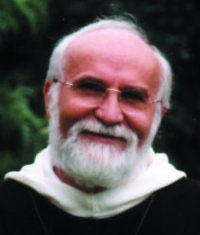
Fr. Jacques Philippe
.
Tags: Donna Garrett, evil, fear, hearts, sin, suffering
This entry was posted on Thursday, March 28th, 2013 at 1:08 pm
You can follow any responses to this entry through the RSS 2.0 feed.
From the official Lourdes website (visit it …. it’s fantastic!)
On 11th. February 1858 Bernadette, her sister Toinette and a friend of theirs, Jeanne, went looking for wood on the meadows and led towards “the place where the canal rejoins the River Gave”. They were in front of the Grotto of Massabielle. Toinette and Jeanne crossed the icy water, crying out with the cold; Bernadette hesitated to do this because of her chronic asthma. She heard “a noise like a gust of wind”, but “none of the trees were moving”. “Raising her head, she saw, in a hollow of the rock a small young lady, who looked at her and who smiled at her. This was the first Apparition of the Virgin Mary
More from the official site
On 25th. March 1858, the day of the sixteenth Apparition, Bernadette went to the Grotto, and on the instigation of the Parish Priest, Abbé‚ Peyramale, asked the Lady for her name. Three times Bernadette asked the question. On the fourth request, the Lady responds in dialect “Que soy era Immaculada Conception“. (“I am the Immaculate Conception”). Bernadette does not understand immediately the meaning of these words. The Immaculate Conception is, as the Church teaches, “Mary, conceived without sin, thanks to the merits of the Cross of Christ”. (The definition of the Dogma of the Immaculate Conception 1854) She goes to the Parish Priest to tell him the Lady’s name. He understands that it is the Mother of God who has appeared at the Grotto of Massabielle. Later the Bishop of Tarbes, Monseigneur Laurence, confirms this.
The Immaculate Conception is, as the Church teaches, “Mary, conceived without sin, thanks to the merits of the Cross of Christ”. Thus the Immaculate Conception is also the sign of what all people, recreated by God are called to be.
A prayer to Our Lady of Lourdes by Pope John Paul II
[powerpress=”devotionals-prayers”]
Hail Mary, poor and humble Woman,
Blessed by the Most High!
Virgin of hope, dawn of a new era,
We join in your song of praise,
to celebrate the Lord’s mercy,
to proclaim the coming of the Kingdom
and the full liberation of humanity.
Hail Mary, lowly handmaid of the Lord,
Glorious Mother of Christ!
Faithful Virgin, holy dwelling-place of the Word,
Teach us to persevere in listening to the Word,
and to be docile to the voice of the Spirit,
attentive to his promptings in the depths of our conscience
and to his manifestations in the events of history.
Hail Mary, Woman of sorrows,
Mother of the living!
Virgin spouse beneath the Cross, the new Eve,
Be our guide along the paths of the world.
Teach us to experience and to spread the love of Christ,
to stand with you before the innumerable crosses
on which your Son is still crucified.
Hail Mary, woman of faith,
First of the disciples!
Virgin Mother of the Church, help us always
to account for the hope that is in us,
with trust in human goodness and the Father’s love.
Teach us to build up the world beginning from within:
in the depths of silence and prayer,
in the joy of fraternal love,
in the unique fruitfulness of the Cross.
Holy Mary, Mother of believers,
Our Lady of Lourdes,
pray for us.
Amen.
Tags: Church, dogma of the immaculate conception, immaculate conception, our lady of lourdes, Parish Priest, sin, st. bernadette
This entry was posted on Monday, February 11th, 2013 at 12:14 am
You can follow any responses to this entry through the RSS 2.0 feed.
[powerpress]
Archbishop Lucas offers insights on the US Catholic Catechism for Adults Chapter 26:
The Second Commandment forbids the wrong use or misuse of God’s name. There are a number of ways in which this happens. Blasphemy uses the name of God and of Jesus Christ as well as those of the Blessed Mother and the saints in an offensive manner. The Catechism teaches that blasphemy consists “in uttering against God—inwardly or outwardly—words of hatred, reproach, or defiance†(CCC, no. 2148). This is gravely sinful. Habitual disrespect for God, displayed in cursing and even in the use of vulgar language, can create an attitude that erodes our relationship with the Lord.
At the same time, we recognize diminished culpability when the name of God is used because of an outburst of undisciplined speech due to passion or unexpected incitement to anger. We need to cultivate a persistent reverence for sacred names; if we do not, we can end up giving bad example and also fall into the sin of blasphemy. It should also be noted that in Scripture, the sometimes passionate language of the Prophets, in which they lament the troubles of their times and utter loud complaints to God, is not blasphemy or the taking of God’s name in vain. It is actually prayer addressed to God.
United States Conference of Catholic Bishops (USCCB)
The Most Reverend George J. Lucas leads the Archdiocese of Omaha.Â
For other episodes in the visit our Archbishop George Lucas page
This programs is based on:
More information can be found here.
We wish to thank the USCCB for the permissions granted for use of  relevant material used in this series.
Also we wish to thank Jim Carroll and Bruce McGregor  for his vocal talents in this episode.
[ezcc]
Tags: Archbishop Lucas, relationship, sin, USCCB
This entry was posted on Tuesday, February 5th, 2013 at 7:02 am
You can follow any responses to this entry through the RSS 2.0 feed.





